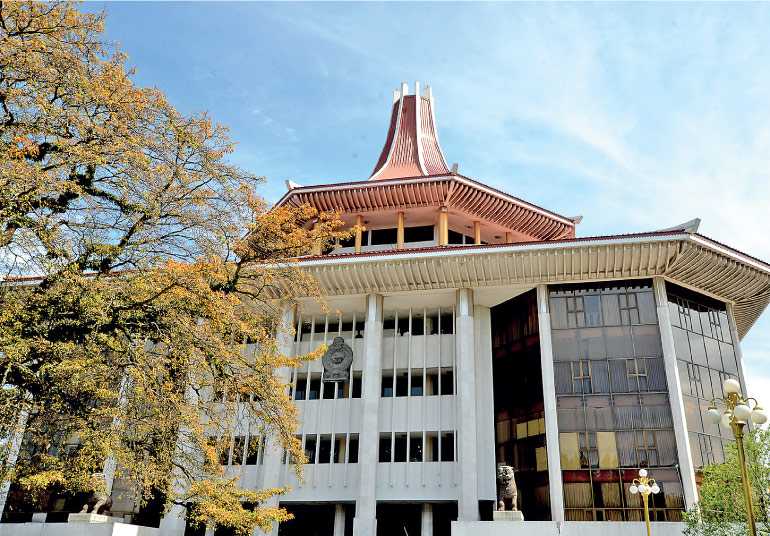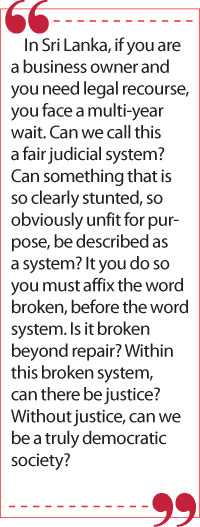Friday Feb 13, 2026
Friday Feb 13, 2026
Monday, 10 August 2020 00:15 - - {{hitsCtrl.values.hits}}

The almost machine like process of taking a day off your job to attend a court date, only to be given another court date three to six months later, is simply dehumanising. Let us call it what it is; an inhumane system, completely unfit for purpose – Pic by Shehan Gunasekara
I stumbled upon an article in an English news daily from 2013, published by Verite Research. It stated that the number of days it takes to enforce a contract through the court system in Sri Lanka was 1,318. That is in excess of three-and-a-half years.
The information was drawn from a World Bank study on the ease of doing business, with enforcing contracts being one of the metrics. A contract is one of the basic means of legal recourse. The article also showed that in Vietnam and Malaysia, time taken to enforce a contract was around 400 days. In Singapore it was 150 days.
You might safely assume that successive administrations since 2013 would have moved mountains to improve this most basic indicator. Especially considering that Sri Lanka was touting itself as a frontier economy in the region in 2013, enforcing a contract ought to have been made much easier and quicker in the interim six to seven years.
Well, in 2013 it was 1,318 days and today, in 2020, the latest report from the World Bank shows that the number of days taken to enforce a contract was; still 1,318 days! I dare say this may have something to do with inadequate reporting or a lack of data. I urge anyone to use the tools at hand to research this further.
Lived experiences
Whatever these indices say about Sri Lanka, the lived experiences of many Sri Lankans are as good a measure as any. All Sri Lankans today, in 2020, know very well to avoid the legal system at any and all costs; as the expense, the time taken and the virtual harassment that the inefficiencies of the court system inflicts on ordinary citizens, are simply not worth the trouble. Even an employee who wants to seek redress for being unfairly treated by their employer will have to wait many years to obtain compensation, despite stringent labour laws. This shows that having strict laws in place is futile unless they can be implemented in a speedy manner.
During my career I recall many instances where actions of competent officers had been undermined by their organisations. I am aware of a specific instance at a foreign bank where there was a case of deferment of revenue by a senior officer, without formally advising the customer. This exposed a systemic failure of the bank’s internal systems, yet officers higher up the ladder were scapegoated. This allowed the bank to not only cover-up the deficiencies of their systems but to also conceal the incompetence of its expatriate CEO.
The expatriate CEO in question was conveniently transferred out of Sri Lanka, while the local officers are still in court, five years later. The expatriate CEO was allowed to take early retirement with full benefits, while the local officers even had their contributions to their own gratuity payments frozen by this foreign bank. The loss of earnings, the effects on their reputations and the stress of the process is one thing. Yet to have an international organisation use all of its financial and legal might to delay, block and mislead legal proceedings is shocking. What is downright disgusting is that the system is built for this type of delaying tactic, where justice comes after many years of court dates and many millions in legal fees.
Whether you are involved in a car accident, if you have had a personal item stolen, if you were verbally abused, the most common course of action taken by any party would be to shrug their shoulders and move on. Going to the police and entering the legal system would basically be the utmost last resort, no matter what crime has been committed.
For reference, in the late 1980s, I met with a car accident while working in the Middle East; another motorist carelessly scratched my vehicle. There was a police officer nearby who immediately intervened and took down my details. Within one week, I received a cheque from my insurance company to pay for the repairs. No going to the police station to record a statement, no prolonged wait for an insurance agent.
In Sri Lanka, if you are a business owner and you need legal recourse, you face a multi-year wait. Can we call this a fair judicial system? Can something that is so clearly stunted, so obviously unfit for purpose, be described as a system? It you do so you must affix the word broken, before the word system. Is it broken beyond repair? Within this broken system, can there be justice? Without justice, can we be a truly democratic society?
There also seems to be a process of never-ending interviews and investigations. Witnesses and others related to an investigation are interviewed by the police for six or eight hours sometimes. I shudder at the thought of pages upon pages of unnecessary notes and records taken at these interviews. Another example of a lack of efficiency or intentional time wasting. The time taken to collect evidence after an offense has been committed simply allows those accused more time to escape punishment.
Justice Ministry since 1947 yet no justice
Sri Lanka has had a Ministry of Justice since 1947. Ministers of Justice throughout the years have included luminaries of public service such as Felix Dias Bandaranaike, Ratnasiri Wickramanayake, Nissanka Wijeyeratne in the past. More recently, W.J.M. Lokubandara, Rauff Hakeem and Wijeyadasa Rajapakshe have held this cabinet position. Yet we see a shocking lack of attention paid to this issue which affects all Sri Lankans, of all walks of life.
By the Justice Ministry’s own latest available statistics, as at end 2016, about 725,000 cases were pending in courts, with the largest number, 535,000 cases, pending in Magistrates’ Courts. Consider what this number actually represents; in human terms. How many people must feel helpless at the lack of action? A wait that could last several years would be bad enough for the owner of an enterprise or an entrepreneur or even a simple shop keeper.
Yet consider those waiting for justice for serious crimes; murder, rape, theft or even harassment. How desperate must someone feel to have been robbed, or had a loved one assaulted, but then wait years upon years for redress, with no guarantee and no definite time-line. How many people will watch the best years of their lives wither away in courtrooms around the country? The almost machine like process of taking a day off your job to attend a court date, only to be given another court date three to six months later, is simply dehumanising. Let us call it what it is; an inhumane system, completely unfit for purpose.
If there are over 700,000 cases pending in our system, do we even dare consider how many cases never make it into the system at all? Such an estimate, if attempted would certainly be multiple times more and would perhaps be the most depressing statistic of all. Usually, what is most insidious, is what the numbers do not show, the situations for which there are no numbers.
Sri Lankans seem to have internalised this notion of helplessness, perhaps this is ingrained in our psyche by design. We simply do not want to risk our precious time, energy, money, well-being and job security to take a case to the courts. The countless, faceless millions of Sri Lankans over the years that have had to simply grin and bear whatever misfortune befell them, deserve better.
Political class and elites play by a different set of rules
Worse still, this system allows those with even a modicum of power, to abuse it, as they know they will not be tried in a court of law, anytime within the next five years. The room this leaves for corrupt practices in every sphere of life is a blot on our society. The vacuum of law and order that this creates will necessitate desperate measures by Sri Lankans. We read many stories of Sri Lankans taking matters into their own hands, most times out of sheer desperation.
To gauge how bad the situation is, you need only revisit the infamous ‘Yahapalanaya’ Government, and its efforts (genuine or not), to litigate cases involving political corruption and abuse of power. President Sirisena at the time decided to form special courts to hear these cases. This too seems to have been an abject failure, similar to the five-year stint of that administration.
The people should also note; if certain cases need to be expedited, for political reasons, it can sometimes happen. Political expediency is the number one priority, not the needs of the common man. Yet another indication that the political class and elites of the country play by a different set of rules.